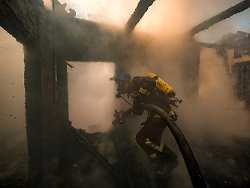Ukraine talk by Maybrit Illner
“This war does not end in Kyiv”
By Marko Schlichting
03/25/2022, 04:13 am
During a special edition of the “Maybrit Illner” talk show, the guests talked about strategies for ending the Ukraine war, among other things. It is also about the dangers for the democratic countries in Europe should Russia emerge victorious from the conflict.
In the Ukraine war, not much happened militarily on Thursday. In the afternoon, however, politicians outside the country tried to find possible solutions. Joe Biden was the first US President to attend an EU summit. The NATO heads of government had also met beforehand, and there was also a meeting of the seven most important industrial nations.
The situation in Ukraine was also a topic on Thursday evening in the ZDF program Maybrit Illner. Because of Illner’s corona disease, Marietta Slomka, known from the “Heute Journal”, stepped in as the host this time. On the show, guests talked about how far Russian President Vladimir Putin could go in the war with Ukraine and what the European Union could do to end it.
The main focus was on the start of a gas embargo against Russia. For example, CDU foreign politician Norbert Röttgen speaks out. The traffic light government, this time represented by the Vice President of the EU Parliament Katarina Barley from the SPD, rejects this step.
“We must win this war”
For the Ukrainian President’s economic adviser, Alexander Rodnyansky, one thing is absolutely clear: “We have to win this war, and we have to understand that there can be no long-term peace with this regime that started this war.” Putin is trying by all means to circumvent the current sanctions against his country. That’s why he also demanded that future gas and oil deliveries be paid in rubles instead of euros.
“No European president will do that,” Norbert Röttgen is certain. “Then we can pay the soldiers their wages in rubles.” In fact, Chancellor Olaf Scholz had already announced in the afternoon that he would not respond to Putin’s demands. Nevertheless, Röttgen criticizes the federal government. Germany is the fourth largest arms exporter in the world, but even Denmark has now overtaken it when it comes to the provision of rocket-propelled grenades.
The federal government has promised fewer weapons than other countries, and even those have not yet been delivered. “That has to change,” demands Röttgen. “There must be transparency and we must be told what we are doing.” Whether such a demand really makes sense during the current war remains to be seen. For Röttgen, an embargo on Russian raw materials is essential. Economics Minister Habeck said that this would put too much strain on the German economy, but all economists would contradict him, said Röttgen.
“Then Putin will face Moldova”
Katarina Barley from the SPD sees things differently. She praises the unity of the EU countries, but warns that the countries obtain around 40 percent of their gas requirements from Russia. For example, Poland, which is demanding an immediate ban on imports of Russian gas and oil, is particularly dependent on Russia. In the event of an embargo, the country would demand support from the EU. That is impossible.
In addition to expanding the sanctions, something else is important for the Ukrainian Rodnyansky: “We need tanks, we need air defense systems,” he says. The front has come to a standstill because Ukraine has no offensive weapons. “The best thing for us would be if Putin just gave up,” he says. In the end, Russia should no longer be able to afford the war. The EU and NATO would have to continue to put pressure on Putin – with further sanctions and with arms deliveries to Ukraine.
Security expert Constanze Stelzenbach has a very dark view of the war. She thinks the Russian propaganda is “crude,” but she doesn’t really trust the Ukrainian statements about the course of the war either. Unlike the other guests, she is not convinced that Ukraine will really win this war. One point is the city of Odessa, which is shooting at Russia with missiles from ships. If the Russian army took the city, Ukraine would be cut off from the Black Sea – and from the port through which about half of Ukraine’s imports come. “And that puts the Russians in front of Moldova. That would create a new situation.”
“It’s about us too”
For the guests of the show, there is a danger to other countries from Russia. It does not necessarily have to be a nuclear threat. Military expert Florence Gaub points out that Putin’s threat to use nuclear weapons is “playing with fear”. Nevertheless, there are considerations to threaten Putin with a nuclear counterattack. “We haven’t done that yet because we don’t go into this game and I don’t think that’s unwise,” says Gaub. But the possibility of such a reaction is not excluded.
Norbert Röttgen sees a danger for other countries, especially if Russia wins a war. “Then we would have a different Europe. Then the world will have learned the lesson: War is worth it.” Florence Gaub sums it up in two short sentences: “This war is also about us. This war does not end in Kyiv.”
